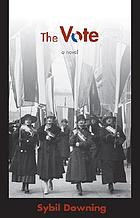Why is historical fiction looked down upon in publishing? Because women like it? I like it. I think it’s a great way to get a taste of important events and eras. This retelling of the U.S. woman suffrage movement is told in three voices: Lucy Burns, Mary Daly, and Kate Brennan. Brennan, a recent Bryn Mawr grad who somewhat accidentally gets arrested at a White House protests and spends two weeks in prison as a result carries most of the book.
The writing can be an eensy bit amateurish, but not enough to be irritating. It feels as if the author has gone to some pains to get the historical details right. A fourth-generation Coloradan, she emphasizes the contributions made by activists and politicians in her state, and by association all states. It made me think about the Equal Rights Amendment and how it has yet to be ratified by the requisite number of states. Sorry Geraldine Ferraro and Alice Paul.
In the current political climate, I enjoyed some righteous anger as the suffragists turned on the Democrats who failed to pass the amendment, voted them out of office, and got the Republicans to do it. Dear Democrats: get shit done, or get out!
I was also impressed with this statement, put in Alice Paul’s mouth:
[Alice Paul] sighed. “The trouble is, you can’t depend on them--the Democrats or the Republicans. Least of all, Lodge. What I said earlier to the contrary, the southerners are the worst. Change isn’t a word in their vocabulary. Think of how many bills have died at their hands, including denying the Negro his civil rights. It’s no wonder we’re at a stalemate. The Confederacy lost the Civil War, but the South rules the country today.”
The idea that the south lost the war, but has won every battle since is one to think about.
Recommended to:
My aunt Myra Terry, who is about to receive an award from the Alice Paul institute, and who pissed off a lot of people when as president of NOW in New Jersey backed a female Republican for governor, rather than her male Democratic opponent, over a welfare reform issue. Not that Whitman was any prize, but sometimes you have to make a statement.
Rebecca Stanton and other Reacting to the Past professors at Barnard.
CATS: none. And they called themselves feminists! (It looks to me like they did, with the term coming into use in the late 19th century.)

Comments
James (not verified)
Wed, 03/30/2011 - 7:33pm
Permalink
I think that historical
I think that historical fictions struggle because historians get turned off to factual discrepancies and historical fiction often leans toward the factual, alienating other casual readers. It is like trying to win two different audiences with one book. Much more difficult than writing to either group.
I have come across a lot of annoying historical fiction books as well as some great ones, but unless the historical fiction relates to a topic that I am interested in or for which I receive several strong recommendations, then I will likely pass.
It is also annoying when people quote historical fiction as historical facts and get the history wrong. This can lead to confusion as to whether or not it is a poor history book or fiction and I likely won't bother to find out.
Others may disagree with me, but that's my opinion with a historian bias.